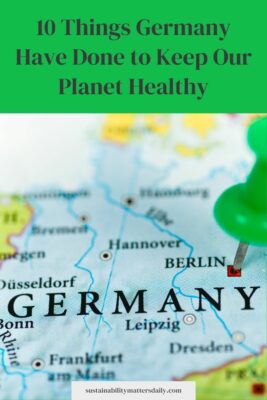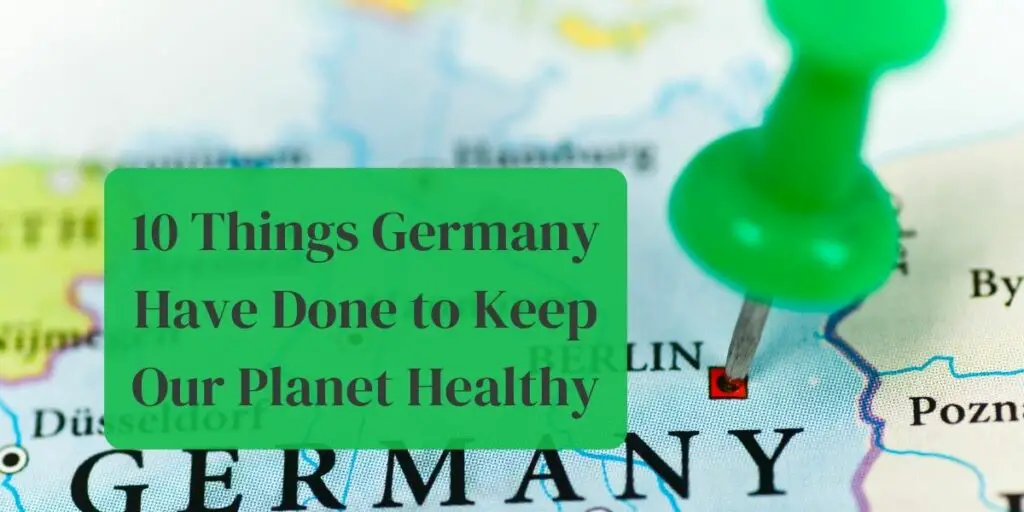Germany is one of the largest countries in Europe. According to Eurostat, they are also the EU country with the highest CO2 emissions.
That comes with responsibilities.
People say it`s “typical German” to work hard and take care of their responsibilities. After working with several German people over the years, I tend to agree. This goes for German politicians as well.
I spent three-four hours to research what Germany is actively doing to reduce their CO2 emissions and fight for a better and greener planet. In this article, I will show you all my findings. This is the perfect article if you are writing a research paper about Germanys’ climate change policies – or for you who are just interested in the topic. 🙂
PS! I wrote the same type of article about China. Even though I was super happy with the result, people started to comment on bad stuff in the comment section. After all, Chinese politics is quite a controversial topic sometimes. If you want to learn what China does to make the world a better place, feel free to read this article (super recommended!).

Table of Contents
- In a hurry? Here are 10 things Germany have done to keep our planet healthy
- #1: The political arena has become green
- #2: Going vegan and reducing their meat consumption
- #3: 46 % renewable energy! It might sound like science fiction…
- #4: German car manufacturers focus on electronic cars
- #5: Being non-environmentally friendly will cost you a lot of money
- #6: Best and most efficient railway system in the world
- #7: “Have you heard about that green and eco-friendly city called Freiburg?”
- #8: Recycling
- #9: Siemens are building windmills all over Germany
- #10: Loads of German companies focus on developing green products
- Is it right to say that Germany are more eco-friendly compared to other European countries?
In a hurry? Here are 10 things Germany have done to keep our planet healthy
- Voting green
- 10 % of the population are either vegan or vegetarian
- Having almost half of their energy coming from renewable energy sources
- Large car manufacturers (Volkswagen & BMW) shift towards electronic vehicles.
- Taxing eco-harmful activities like oil & gas
- Brilliant railway infrastructure
- Freiburg – the greenest city in the world
- Germans have the best recycling rates in the world!
- Developing huge windmill parks
- Very high eco-innovation performance
Let’s dig into every bullet point to learn the German system even better.
#1: The political arena has become green
They say that one picture tells more than 1000 words. I would argue that a graph does the same thing:

This is an overview of how much of the German population that voted for the Green party in the recent elections. As you can see, the development is positive since the party (called Die Grüne in German language) was established in 1980.
#2: Going vegan and reducing their meat consumption
Are you one of those who see German culture as something heavily connected with beer and fat sausages? If so, you are not alone.
However, new findings might indicate that Germans don`t have the same appetite for meat anymore. They still love beer though.
As established in a previous article I wrote, reducing your meat consumption is one of the most important things you can do to prevent global warming.
It`s quite easy to explain the importance of eating less meat. The less people who buy meat products, the less meat will be produced. Once the production goes down, so does the CO2 emissions.
How many vegetarians/vegans are there in Germany?
There is only one official study that has the answer to this. And that study was published back in 2017, which makes it a bit old. However, the Allensbach Institute for Public Opinion Research did some quite extensive research to figure out the correct numbers.
According to their study, there are about 9.3 million Germans who are following a vegan and/or vegetarian diet. That counts for more than 10 % of the total population.
#3: 46 % renewable energy! It might sound like science fiction…
This is an old article from National Geographic that maps out the recent development within the German energy sector. According to this article from National Geographic, about 27 % of the domestic energy consumption can be traced back to renewable energy sources.
After doing some research, I quickly figured out that the 27 % number was false. Well..not false. But definitely outdated.
The latest government report from Q4 in 2019 claims that the number is now at 46 % – which is amazing.
What does the future look like for renewable energy in Germany?
It looks bright. The government has an outspoken goal of reaching 80 % within 2050. With the current development, that would not be too hard to achieve. Germany has established itself as one of the countries with the greenest energy supply in the world, which is a superb achievement.
#4: German car manufacturers focus on electronic cars
Most people do not picture a BMW or Volkswagen to be very eco-friendly. The reputation of German cars has always been “huge, robust, safe and… using a lot of fuel”. That is about to change.
According to new government policies, all German car manufacturers will shift towards a green product line. However, that is not only beneficial for the German society. This new report might suggest that more than 400,000 people, almost one percent of the workforce in Germany, might need to change their jobs due to the radical change within the auto industry.
This is another example that illustrates how important it is for the biggest economy in Europe to focus on developing eco-friendly products in the future.
What’s the best example of a modern electric German car?
I would say that BMW iX3 would be the very best option. This is a video from China where the CEO of BMW introduced the car for the first time in 2020:
#5: Being non-environmentally friendly will cost you a lot of money
Do you want to go to Germany to rent a car and drive down Autobahn? In that case, you might want to consider using an electric car.
The eco-tax on gas is high in Germany (which is not uncommon in Northern Europe). It does not only cover fuel for vehicles but also heating oil and fossil fuels. As of 2020, consumers would have to pay 65 cents for every liter gas.
Will there be more taxes in the upcoming year?
The German government seems to be influenced by other European countries. These are just some of the new environmental tax laws that have been suggested (but not yet fully implemented):
– Plastic bag tax.
– Food waste tax.
– That you have to pay for a license to hunt and fish in the wild.
#6: Best and most efficient railway system in the world
I have traveled by train in at least 10 different European countries. No one is even close to Germany when it comes to prices, efficiency, and comfort. When I was a student in Denmark, I decided to take the train from Århus to Berlin. In Hamburg, you had to swap from DSB (Danish) to DB (German). I do not want to come out as religious or anything, but it was like stepping into a different dimension.
Just for reference, this was the route I was taking (thank you Paint skills & Google Maps):

Some fun facts about the German railway system:
– Of all the European railway companies, they have the highest ranking among foreign tourists. In other words: there are no countries in the world where foreigners are more happy with the trains.
– Germany built the first-ever international railtrack. That went from Cologne to Antwerp (Belgium).
– Germany has, by far, the biggest railtrack in Europe. With a total of 46,000 kilometers, Germany is quite far ahead of France (29,000 km).
#7: “Have you heard about that green and eco-friendly city called Freiburg?”
When I researched this article, I talked to a German friend of mine on Facebook. He did not seem to know much about environmental topics, but he knew about Freiburg. This is some sort of national treasure when Germans want to brag about how great they are at eco-friendly technology.
After all, making a city of nearly 300,000 inhabitants pollution-free is a great achievement. Let`s dig a bit deeper into the facts.
Learn more about the 6 principles of sustainable cities.
But why is it that Freiburg can be deemed an eco-friendly city?
– Their whole city center is pedestrian-friendly. Other large European cities are trying to do the same, like Oslo. This is how Oslo became the first car-free capital in the world.
– Heavy investments in electric buses and trams.
– A lot of green lunges and beautiful parks (look at the video below).
– Only 30 % of the traffic within the city center is done by motorized vehicles. The rest are pedestrians, public transportation and cycling.
– Talking of cycling: Freiburg got some of the best bike tracks in the world!
In order to illustrate how green Freiburg is and how easy it is to get around by bike, I believe this two minutes video would be useful:
#8: Recycling
The German government has built a fantastic recycling system. And the German population loves to use it. That gives excellent results. Germany is the country with the highest recycling rate in the world.
Some fun facts about the German recycling project:
– Around 60 % of all municipal waste is recycled.
– Close to 90 % of all the plastic is recycled.
– Germany have so good recycling technology that other neighboring countries ship their plastic to Germany (!) for processing. This practice ended up starting a heated debate among Norwegian politicians as they asked about the environmental impact of shipping loads of plastic to other countries.
#9: Siemens are building windmills all over Germany
You have probably heard about the tech company Siemens without knowing it’s German.
That’s a company that has spent a huge amout of time developing windmill parks all over Europe. A friend of mine worked at Siemens for a while and revealed that about 50 % of their resources are currently going towards renewable energy development. That is MASSIVE!
In total, there are about 35,000 wind turbines in Germany – which is (by far) the highest number in Europe.
Do you have any examples of successful German windmill projects?
Yes, I do. On the east coast of Germany, the conditions are perfect for renewable energy projects. The wind is strong, and most people live a bit far away from the sea (=they do not have to look at these gigantic machines every day). New York Times brought a reporter to a small island called Heligoland to have a look at one of the largest windmill parks in Europe:
#10: Loads of German companies focus on developing green products
There’s a reason why people stop eating meat and start eating “plant-based stuff that reminds of meat”. Because some company saw a market for that.
According to this official report from EU, German companies are brilliant at coming up with new innovative & eco-friendly solutions. The report ranks all EU countries based on their “eco-innovation performance”.
That literally means: “How great are companies in that given country to come up with new eco-friendly solutions on current problems?”.
The whole list can be seen below:

Is it right to say that Germany are more eco-friendly compared to other European countries?
That might be difficult to measure. Some statistics (like the eco-innovation performance) might suggest that. However, it’s very difficult to measure countries against each other. There are many reasons for that:
- Cultural aspects. Denmark are best in the world on reducing food waste, but at the other hand they love eating meat.
- Different countries are good at different things. For instance, Sweden has developed a unique way of using trash for energy. On the other hand, their flying habits are really bad.
- Population size. Germany is a huge country. It’s much easier for Luxembourg to implement nation-wide new green policies. It takes a lot of time in countries like Germany.
- How dependent your economy is on “polluted money sources”. For instance, Norway got one of the highest GDP per capita in the world. On the other hand, we know that an awful lot of their money comes from the oil industry.
In other words, it’s nearly impossible to say whether or not Germany are doing better than other European countries. What we know is that an awful lot of positive development is taking place in the largest economy of Europe, which is super good news. 🙂



WOHOOO!! MY BELOVED GERMANY 😀
We are doign a lot for the world. Not only politicial and economical, but also for the environment. I love this article
I come from Germany, which means I am biased.
However. I feel Germany is doing a lot more for the environment when we compare it to other European countries. We don’t have the oil (like the Norwegians) , we don’t travel too much (like the Danish people) and we tend to vote for the political parties that demand a green change.